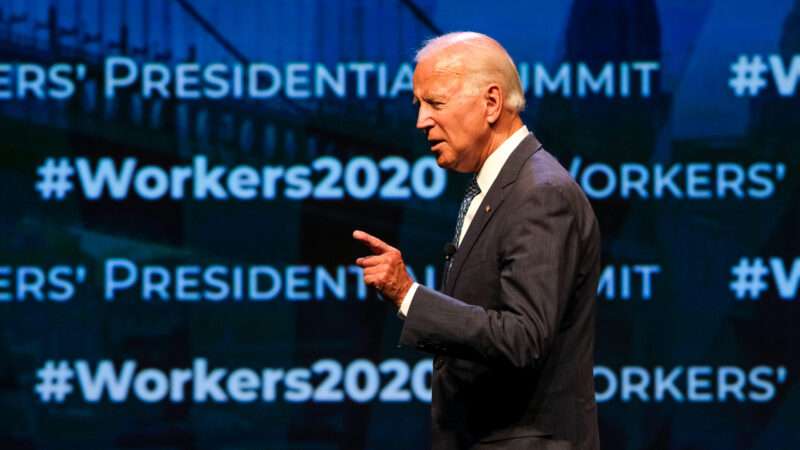

Buried inside more than $2 trillion in proposed spending on everything from highways to child care, President Joe Biden's "American Jobs Plan" would also force non-union workers to pay union dues even in states that have explicitly said that's not mandatory.
Biden glossed over that detail in Wednesday's speech outlining the particulars of his "American Jobs Plan." He made just a single reference to the Protecting the Right to Organize (PRO) Act, which passed the House earlier this month, calling it a bill that would "help workers organize."
In reality, the PRO Act strengthens unions by telling workers to pay up. Among other things, the bill would amend parts of the National Labor Relations Act to allow the federal government to stomp out the so-called "right-to-work" laws that forbid unions from forcing non-members to pay a share of union dues. If passed, the PRO Act would roll back the rights of individual workers, who would no longer get to choose whether they want to financially support a union.
Passage of the PRO Act is obviously a major political priority for labor unions—Richard Trumka, president of the AFL-CIO, recently described it as a "game-changer" in an interview with NPR—because it wold provide a new stream of revenue even as the overall number of unionized workers continues to decline.
But it is a strange way to pursue Biden's ultimate goal improving America's infrastructure as a form of economic stimulus.
"We view this measure as a significant threat to the viability of the commercial construction industry," warns Stephen Sandherr, CEO of the Associated General Contractors of America, an industry group. He predicts that passage of the PRO Act would usher in more labor unrest, and observes that it is difficult to complete large-scale infrastructure projects when "work is idled, workers are unpaid, and projects go uncompleted."
It's also a move that seems to misread obvious economic signals. Not only has the number of states with right-to-work laws been growing, but those states have seen manufacturing employment grow more than twice as fast since 2010 when compared to states without right-to-work laws. If Biden is seeking an economic boost for the country, he'd push to let all workers enjoy the freedom to choose whether to support a union or keep more of their paychecks.
Beyond the right-to-work provision, the PRO Act is a grab bag of policies that would help tip the scales towards unions. It would force employers to turn over employees' private information—including cellphone numbers, email addresses, and work schedules—to union organizers. It would accelerate the National Labor Relation Board's official timetable for union organizing elections in non-union workplaces. And it would codify so-called "card check" elections, removing the protection of the secret ballot when a workplace votes to unionize.
The White House says Biden's "American Jobs Plan" will give workers "a free and fair choice to join a union." But in calling for the passage of the PRO Act, Biden is actually taking that choice away from many workers who currently enjoy it—and transfer money directly from workers' paychecks to labor unions' bottom lines.
"The PRO Act does strengthen unions, but it does so mainly by giving unions more power to force recalcitrant workers to fall in line," says Sean Higgins, a research fellow at the Competitive Enterprise Institute, a free market think tank. "The Biden administration wants to strip workers of their right for their own good."
Read Entire Article Here: Reason Magazine Articles
via IFTTT
